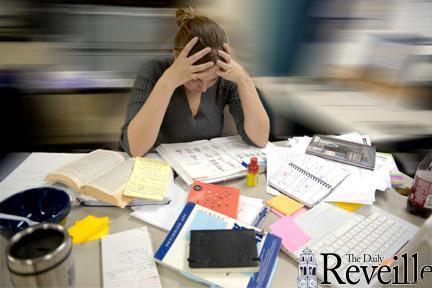If you happen upon a horde of brain-dead zombies walking through the Quad next week, don’t be alarmed. “The Walking Dead” isn’t being filmed on campus, and the apocalypse hasn’t arrived just yet.
It’s just finals week, and it decays much of the student body.
During finals week, students cram an entire semester’s worth of material within the span of five days and hope for the best. Even students with flawless GPAs struggle with finals week, with some final exams and projects making up more than 30 percent of a student’s entire grade.
A study session of such huge proportions is often accompanied by a drastic change in lifestyle as well. Many students alter their sleep schedules and diets to accommodate the stresses of week 16, and the changes are rarely healthy.
Anthropology junior Kat Donner rarely sleeps during finals week.
“I’m lucky if I get four hours,” Donner said.
Many students try to fend off sleep, a necessary activity for proper physiological function, with beverages loaded with caffeine and sugar, said mass communication sophomore Zach Heathman.
“I don’t really eat full meals — I snack a lot instead,” Heathman said.
Elementary education senior Emily Calloway said she doesn’t usually bother to cook during finals week.
“I eat bad foods. It’s easier to grab Cane’s six times a day because it’ll take less time than actually preparing food,” Calloway said.
While students feel they often need to adapt these temporary lifestyle changes to pass their classes, professionals warn they come at a cost.
Darcy Johannsen, a nutrition researcher at the Pennington Biomedical Research Center, said caffeinated beverages may provide students with up to four hours of increased energy, but when the effects of the caffeine and sugar disappear, drinkers often feel more tired than before.
“Caffeine stimulates cortisol production, which makes you feel more alert and energetic, but when you stop producing so much, you crash,” Johannsen said.
Johannsen also warned that a mixture of unhealthy dieting and sleep deprivation could produce potentially catastrophic results.
“People who are sleep deprived for two days are less alert than people who drive under the influence of alcohol,” Johannsen said.
Johannsen suggested that making time for sleep and eating healthier foods could actually improve students’ final grades.
“Sleep and nutrition are important to performance,” Johannsen said.
As long as final exams represent such a substantial part of a grade, however, it’s unlikely students will change their unhealthy finals week habits.
Donner said she would probably be able to manage her schedule and diet more easily if final tests were worth less than they typically are.
“I wouldn’t mind taking more tests during the rest of the semester if it meant the last one was worth a little less,” Donner said.
Students sacrifice sleep, health for finals
By Panya Kroun
April 30, 2014








